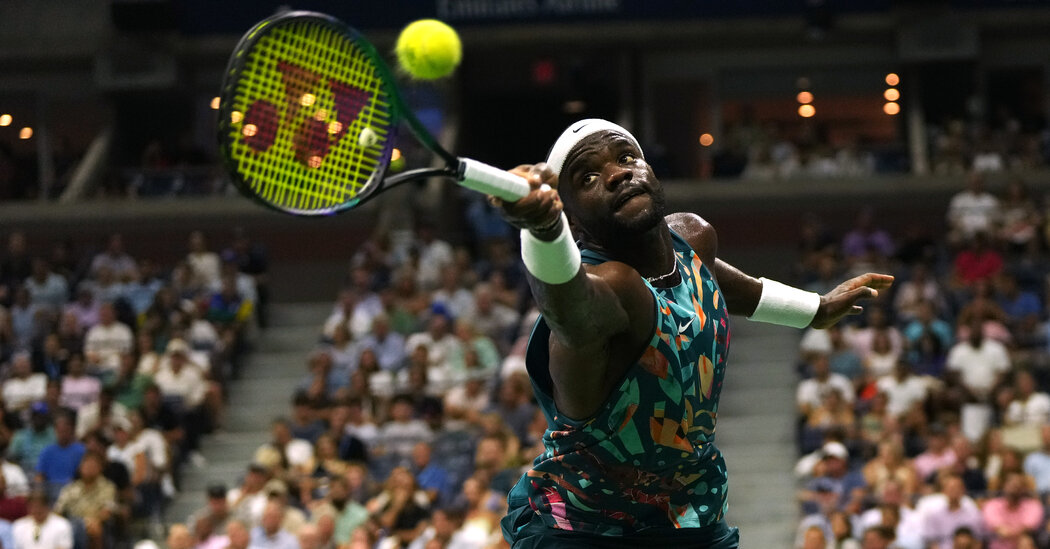Frances Tiafoe was making the rounds. Upstairs, downstairs, inside, outside. Touching all corners of the Billie Jean King National Tennis Center, conducting 90-second interviews, shaking hands, trying hard to manage a smile for everyone in his path.
It was the eve of the United States Open last month, and Tiafoe, 25, was returning to the scene of his greatest triumph, a semifinal finish at the 2022 Open that included an upset of the four-time champion Rafael Nadal.
The Open represented Tiafoe’s coming-out party. Ranked No. 26 entering the tournament last year, he began this year’s Open in the top 10, largely on the strength of winning two ATP titles, in Houston and Stuttgart, Germany, this season. He also reached the semifinals at Indian Wells before losing to Daniil Medvedev.
But Tiafoe, whose career began when his parents emigrated from Sierra Leone and his father became head of maintenance at the Junior Tennis Champions Center in College Park, Md., struggled at the majors this year.
He lost in the third round at the Australian and French Opens and at Wimbledon. At the U.S. Open, he was defeated in the quarterfinals by a fellow American, Ben Shelton.
Tiafoe and Shelton were chosen by John McEnroe, the captain of Team World, to play in the Laver Cup in Vancouver, British Columbia.
At last year’s cup, Tiafoe and Jack Sock beat Nadal and Roger Federer in the final match of Federer’s career. Tiafoe then beat Stefanos Tsitsipas to clinch victory for Team World. It was the first time in the five-year history of the event that Team Europe failed to win.
The following interview has been edited and condensed.
What was it like to play Roger and Rafa in Roger’s last match?
Me and Jack were joking, should we go hard, should we not, should we make it a good show? I’m glad we went out there and played hard.
The result was so irrelevant. Tennis won that night.
What did you say to Roger when you met at the net after the final point?
“Thank you for the last 20-plus years. Thank you not only for your on-court play, but for who you are as an individual. What you’ve done will never die.”
Then, in the clinching match, you had to save four match points against Tsitsipas?
Man, it felt like I was down 100 match points. It was crazy. I had never experienced something like that before. Incredible shotmaking with legends sitting on the bench. It was an unbelievable atmosphere.
When you look back on this year, do you say it’s been a great year, or that you need to kick it up a notch?
I think it’s been a great year outside of the Slams. But the Slams are the only thing I really care about, to be fair.
You’ve spoken about Arthur Ashe and the privilege of being a man of color in this sport. But Arthur also spoke of the burden he felt. Do you feel the pressure of being in this position and having to motivate others?
One hundred percent, because it’s not like basketball or football, which are predominantly sports of color. Not only that you’re one of a few, but you’re doing it at a super high level. There are expectations, but people are looking up to you and wanting to be like you. You’re in a position to change people’s lives. It’s definitely a burden, but at the same time it’s a blessing.
You have mentioned that right before you play a match, the most important thing is that your mother tells you how much she loves you. How critical is your family to your success?
Family is everything to me. I’d do anything for my family. I play this game at a high level for my family. That’s one of my biggest motivations every day. My family can’t even believe we’re in this position.
Is there one life goal that defines you?
Probably that when I’m done, both of my parents will be able to kick up their feet. I want to be in a position to help kids in Sierra Leone play the game of tennis. It’s not really about me.


